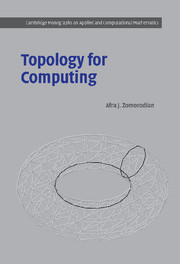3 - Group Theory
Published online by Cambridge University Press: 19 August 2009
Summary
Having examined the structure of the input to our computations in the last chapter, we now turn to developing the machinery we need for characterizing the topology of spaces. Recall that we are interested in classification systems. Group theory provides us with powerful tools to define equivalence relations using homomorphisms and factor groups. In the next chapter, we shall utilize these tools to define homology, a topological classification system. Unlike homeomorphy and homotopy, homology is discrete by nature. As such, it is the basis for my work.
The rest of this chapter is organized as follows. In Section 3.1, I will introduce groups. I devote Section 3.2 to developing techniques for characterizing a specific type of groups: finitely generated Abelian groups. In Section 3.3, I examine advanced algebraic structures in order to generalize the result from the previous section.
Abstract algebra is beautifully lucid by its axiomatic nature, capturing familiar concepts from arithmetic. The plethora of arcane terms, however, often makes the field inscrutable to nonspecialists. My goal is to make the subject thoroughly accessible by not leaving anything obscure. Consequently, there is a lot of ground to cover in this chapter. My treatment is derived mostly from the excellent introductory book on abstract algebra by Fraleigh (1989), which also contains the proofs to most of the theorems stated in this chapter. I used Dummit and Foote (1999) for the advanced topics.
- Type
- Chapter
- Information
- Topology for Computing , pp. 41 - 59Publisher: Cambridge University PressPrint publication year: 2005



